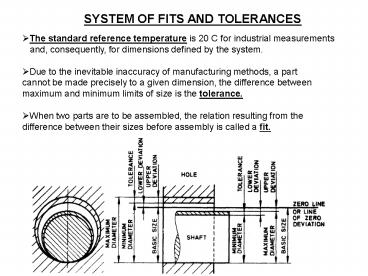SYSTEM OF FITS AND TOLERANCES PowerPoint PPT Presentation
1 / 32
Title: SYSTEM OF FITS AND TOLERANCES
1
SYSTEM OF FITS AND TOLERANCES
- The standard reference temperature is 20 C for
industrial measurements - and, consequently, for dimensions defined by
the system. - Due to the inevitable inaccuracy of manufacturing
methods, a part - cannot be made precisely to a given dimension,
the difference between maximum and minimum limits
of size is the tolerance. - When two parts are to be assembled, the relation
resulting from the difference between their sizes
before assembly is called a fit.
2
Tolerance
- How to decide tolerance?
- Functional requirements of mating parts
- Cost of production
- Available manufacturing process
- Choose as coarse tolerance as possible without
compromising functional requirements - Proper balance between cost and quality of parts
3
(No Transcript)
4
CLEARANCE FIT
Maximum shaft dimension lt Minimum hole dimension
FIT - condition of looseness or tightness
between two mating parts being assembled together
5
INTERFERANCE FIT
Maximum Hole size lt Minimum Shaft size
6
TRANSITION FIT
Obtained by overlapping of tolerance zones of
shaft and hole Does not guarantee neither
clearance nor interference fit
7
To obtain different types of fits, it is general
practice to vary tolerance zone of one of the
mating parts
HOLE BASED SYSTEM- Size of hole is kept constant,
shaft size is varied to get different fits.
SHAFT BASED SYSTEM- Size of shaft is kept
constant, hole size is varied to get different
fits.
8
A fit is indicated by the basic size common to
both components, followed by symbol corresponding
to each component, the hole being quoted
first. E.g. 45 H8/g7
9
Representation of Tolerance 1) Letter Symbol
The selection of letter freezes one limit of hole
/ shaft (how much away from Basic size)
Basic Size
45 E8/e7
One can have different possible combinations eg.
45H6g7, 45H8r6, 45E5p7
E.S. upper deviation E.I. lower deviation
H lower deviation of hole is zero
h upper deviation of shaft is zero
10
Representation of Tolerance 2) Number or Grade
IT01, IT0, IT1,.IT16
Tolerance Grade defines range of dimensions
(dimensional variation) There are manufacturing
constraints on tolerance grade chosen
11
(No Transcript)
12
RANGE IN A GIVEN TOLERANCE GRADE
13
(No Transcript)
14
(No Transcript)
15
Representation of Tolerance
The selection of Tolerance grade number freezes
the other limit of hole / shaft
H lower deviation of hole is zero
16
Together (Letter Grade) on both mating
components decide quality of fit
Representation of Fit
INTERFERENCE FIT
H7 Tol Grade 7 mean 21µ variation (H means
upper deviation zero)
p6 Tol Grade 6 means 13µ variation (p means
upper deviation is 22 µ)
17
Tolerance on Components
18
(No Transcript)
19
Estimate kind of fit
20
FITS APPLICATIONS
21
(No Transcript)
22
FITS AND TOLERANCES
The components of the toleranced dimension shall
be indicated in the following order a) the basic
size, and b) the tolerance symbol.
If, in addition to the symbols it is necessary to
express the values of the deviations or the
limits of size, the additional information shall
be shown in brackets.
Permissible deviation
- If a dimension needs to be limited in one
direction only, this should be indicated by
adding min or max to the dimension.
23
- The upper deviation or the upper limit of size
- shall be written in the upper position and the
lower - deviation or the lower limit of size in the lower
- position, irrespective of whether a hole or a
shaft is - toleranced.
- The tolerance symbol for the hole shall be placed
before that for the shaft or above it, the
symbols being preceded by the basic size
indicated once only.
Indication of Tolerances on Angular Dimensions
24
(No Transcript)
25
(No Transcript)
26
(No Transcript)
27
(No Transcript)
28
(No Transcript)
29
STUFFING BOX
30
31
(No Transcript)
32
(No Transcript)

